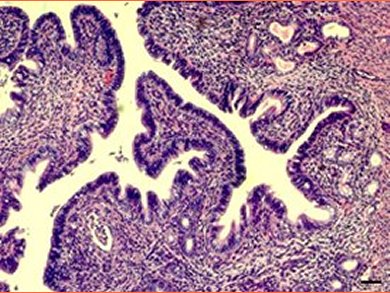In endometriosis, uterine tissue grows in other parts of the body, such as the abdominal cavity, ovaries, vagina, and cervix. The condition is often hereditary and is found in 5 to 15 % of women of reproductive age, affecting over 70 million women worldwide. Although the disorder has been studied for many years, its exact cause and how it develops remained unclear.
Hugh S. Taylor and colleagues, Yale School of Medicine, USA, found the genetic basis of endometriosis. They discovered an inherited mutation located in a regulation part of the KRAS gene, which leads to abnormal endometrial growth and endometrial risk. 31 % of the 132 tested women with endometriosis carried the mutation. It was found in 5.8 % of the general population.
The presence of this mutation was also linked to higher KRAS protein levels and associated with an increased capacity for these cells to spread. It also may explain the higher risk of ovarian cancer in women who have had endometriosis.
- A polymorphism in a let-7 microRNA binding site of KRAS in women with endometriosis,
Olga Grechukhina, Rafaella Petracco, Shota Popkhadze, Efi Massasa, Trupti Paranjape, Elcie Chan, Idhaliz Flores, Joanne B. Weidhaas, Hugh S. Taylor,
EMBO Molec. Med. 2012, 4(3).
DOI: 10.1002/emmm.201100200
EMBO Molecular Medicine, one of the highest cited journals in the biomedical sciences, is now a fully Open Access journal.




